Share
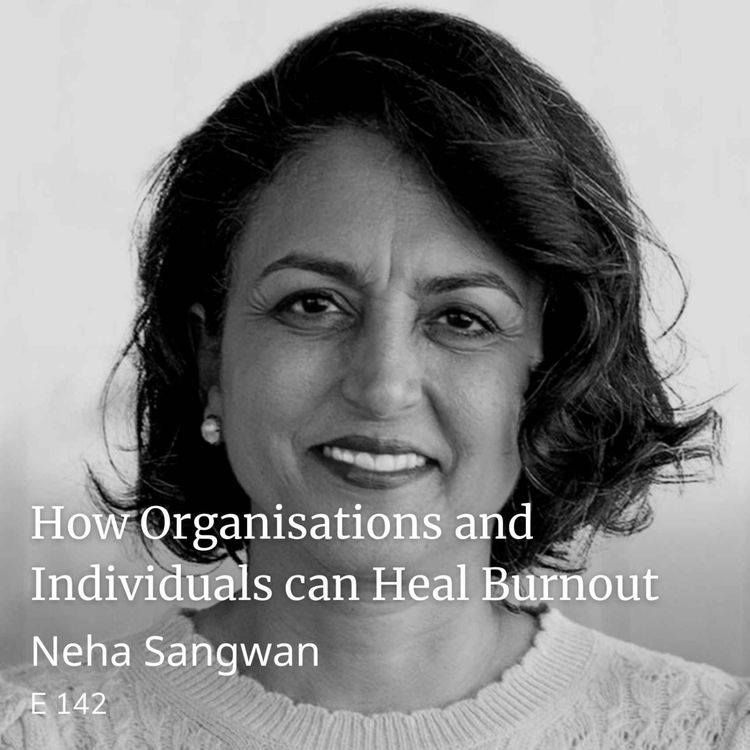
Corporate Unplugged
How Organisations and Individuals can Heal Burnout
Sometimes a physical ailment isn't physical, says Neha Sangwan, MD and CEO and founder of Intuitive Intelligence. In fact, stress causes or exacerbates more than 80% of illnesses, so rather than simply treating the physical injuries, we need to be asking people what's at the root of their stress.
In this episode of Corporate Unplugged, Neha explains why her passion is teaching people how to communicate with themselves, and with each other, to navigate their emotions, manage their energy, to learn how to keep themselves well so that collectively, as humans, we can all rise together now, and in the future.
“What I have learned is, self-care is not selfish, it's self-full. It's how I can, over time, be able to serve in the world in a way that comes from a replenished full, energized place, full of vitality and energy, versus a depleted exhausted place.”
To find out more, download and listen to this latest episode.
On today’s podcast:
- Why self-care isn’t selfish
- What is burnout?
- The three phases of burnout
- Why we need human connection
- Bridge leaders of today, to be leaders of tomorrow
Links:
More episodes
View all episodes

158. Healing Innovation & AI Co‑Creation
45:52||Season 2, Ep. 158In this episode of Corporate Unplugged, Vesna Lucca talks with scholar‑entrepreneur Raiya Kind, who lives at the crossroads of language, consciousness and AI, and serves as Chief Emergence Officer of Wisdom Beyond. Together, they explore what it really means to shift innovation from disruption and speed toward healing, restoration and integration.Raiya introduces the idea of embodied leadership, where leaders slow down, deepen their mind–body connection and tap the body’s vast data‑processing capacity to access wiser, more aligned decisions. She shares how group containers for “healing innovation” allow high‑impact AI and systems leaders to see and integrate old wounds and limiting beliefs so that new insight and strategy can emerge naturally from the collective field.The conversation also reframes AI as a co‑creator rather than a saviour or villain. Raiya explains why treating AI as either rescuer or threat erodes human agency, and how discerning collaboration—with humans firmly in the loop—can help AI amplify our deepest values, not our fears.They dive into belonging, coherence and community as essential containers for evolutionary leaps, and imagine a future where “AI in the loop” seamlessly supports human connection, interdependence and joy in everyday life.On today’s podcast:● What healing innovation looks like in practice for leaders and teams● Embodied leadership and why slowing down unlocks breakthrough creativity● AI as co‑creator: keeping discernment and human agency at the centre● Belonging, interbeing and the role of community in transformative work● Designing AI and systems for coherence, not just productivity and profit● Why joy, curiosity and self‑care are strategic filters for the future of work
157. Unlocking Deep Leadership Intuition
45:34||Season 2, Ep. 157What if intuition was your greatest business tool? In this episode, Vesna Luca explores the power of deep intuition with renowned Icelandic thought leader, author, and serial entrepreneur, Hrund Gunnsteinsdottir. Drawing on her extensive global experience in leadership, innovation, and systemic change, Hrund reveals how Iceland’s “InnSæi”—the sea within—can transform the way we lead, decide, and live.Hrund explains that intuition is far from mystical; rather, it is a form of deep intelligence, blending embodied awareness with subconscious processing. She shares how cultivating rituals like daily journaling, contemplative walks, and meaningful pauses can unlock creativity, strengthen self-trust, and help leaders make courageous decisions under uncertainty. The conversation unpacks the threefold Icelandic concept of InnSæi: seeing within, seeing from the inside out, and the sea within, illustrating how personal transformation ripples out to shift organizations and systems.Listeners will discover how modern leadership depends on authentic imagination, the courage to experiment, and the strength to embrace vulnerability—essential skills in times of continuous transformation. This episode will inspire leaders to trust their inner compass, build resilient teams, and lead with hope and curiosity. Hrund’s stories and insights offer practical guidance for anyone who wants to thrive amid complexity and create a more human-centered workplace and world.On today’s podcast:The meaning and power of “InnSæi”—Icelandic intuitionBuilding strong, innovative teams through self-awarenessDaily rituals leaders can use to nurture intuitionHow imagination fuels hope and resilienceMaking high-stakes decisions in uncertainty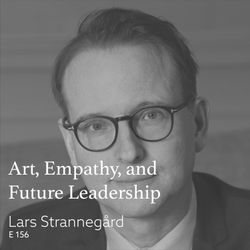
156. Art, Empathy, and Future Leadership
43:40||Season 2, Ep. 156In this episode, Vesna is joined by Lars Strannegård, President of the Stockholm School of Economics, for a profound conversation on education, leadership, and the critical role of art and empathy in shaping the future of business and society. Lars shares his formative experiences living abroad, highlighting how cultural exposure and the lack of it shaped his perspective on inclusion and the importance of creative expression. He discusses the vision for SSE, emphasizing the need for students to leave with a broad, reflective mindset, ready to serve society and make a positive impact. In an era where artificial intelligence is rapidly transforming the landscape, Lars argues that the development of human intelligence—skills like empathy, self-awareness, and critical thinking—becomes more vital than ever. He introduces the FREE framework guiding SSE: Fact-based, Reflective, Empathetic, and Entrepreneurial mindsets, which together foster responsible leadership. The conversation explores the transformative power of art as an “intellectual and emotional itching powder,” challenging individuals to reflect and grow. Lars also stresses the importance of inclusion, respect, and the need for everyone to feel heard and valued in organizations and society. The episode offers practical wisdom for leaders to widen their perspectives, embrace discomfort, and prioritize relationships as the foundation of meaningful leadership.On today’s podcast:● Why art and culture are essential for leadership in the age of AI● The FREE framework: Fact-based, Reflective, Empathetic, Entrepreneurial● How formative experiences shape empathy and inclusion● The transformative power of art as a catalyst for self-reflection● Why inclusion and respect are critical for responsible leadership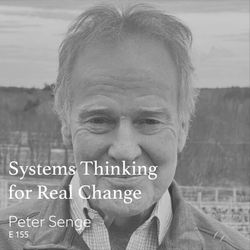
155. Systems Thinking for Real Change
56:05||Season 2, Ep. 155In this episode, Vesna welcomes Dr. Peter Senge, renowned MIT Sloan lecturer and pioneer of systems thinking, to the Corporate Unplugged Podcast. Peter explores why true change requires a shift in how we see interdependence, not just in business but in society at large. Drawing from decades of work with organizations and indigenous communities, he explains how deep, sustainable transformation starts with cultural and institutional shifts—far beyond quick fixes or policy tweaks.Peter shares practical ways leaders can catalyze systemic change, emphasizing the power of authentic partnerships and “pre-competitive collaboration”—even among rivals. He highlights the importance of leadership as a developmental journey rooted in purpose, service, and the ability to create generative social fields where trust and innovation can flourish. Peter also reflects on the wisdom of indigenous cultures and the critical need for hope and honest dialogue in times of uncertainty.On today’s podcast:Why systems thinking is essential for real, lasting changeHow leaders can embody and catalyze transformationThe value of partnerships and collective intelligenceLessons from indigenous cultures on resilience and memoryWhy hope, courage, and relational space matter now more than ever
154. Polymathy, Love & Awakening
01:03:33||Season 2, Ep. 154Robert Edward Grant, a modern polymath, inventor, author, and visionary entrepreneur, joins Vesna on Corporate Unplugged to explore the profound intersections of love, leadership, and multidimensional thinking. With over 80 patents and contributions spanning fields like cryptography, geometry, and healthcare, Robert shares his unique journey of bridging science, spirituality, and innovation.In this episode, Robert reflects on how love drives his purpose and how self-awareness and judgment-free living are essential for personal and societal transformation. He discusses the importance of polymathy in addressing complex challenges and why humanity is on the cusp of a collective awakening. From sacred geometry to the power of synchronicity, Robert offers a thought-provoking lens for leaders seeking to create meaningful impact.In this episode:Why love is the ultimate driver of purposeThe role of polymathy in solving global challengesHow judgment creates suffering and self-love heals itHumanity’s awakening and interconnectedness through synchronicitySacred geometry as a meditative practice
153. Hope, Leadership, and Nature’s Future
41:06||Season 2, Ep. 153In this episode of Corporate Unplugged, Vesna Lucca speaks with Thierry Malleret, economist, author, and founder of Summit of Minds. Thierry shares his unique perspective on leadership, sustainability, and the urgent need for businesses to embrace stakeholder capitalism. Drawing from his diverse career—including years at the World Economic Forum—Thierry reflects on the challenges and opportunities shaping our world today. “Without nature, there is no economy,” Thierry emphasizes, underscoring the critical role of natural capital in sustaining our future. Through his Summit of Minds initiative, he immerses leaders in nature-based experiences to inspire action: “When you see glaciers retreating almost visibly, it compels you to act.” Thierry also reveals his creative side as a novelist. His latest geopolitical thriller, Deaths at Davos, explores themes of power, greenwashing, and global influence. “Fiction allows me to ask bold questions about our world without the constraints of non-fiction,” he explains.Listeners will hear Thierry’s candid thoughts on cross-generational collaboration: “Younger generations are today’s change agents—more attuned to sustainability and determined to make a difference.” He also highlights the importance of listening as a key leadership skill: “Too many leaders talk at people instead of with them. Listening is rare but transformative.”This episode is a call to action for leaders and individuals alike to embrace hope through decisive action, collaboration, and a commitment to sustainability.On today’s podcast:Thierry’s non-linear career journeyThe importance of stakeholder capitalismWriting fiction to explore global challengesNature as an economic cornerstoneCross-generational dialogue as a force for change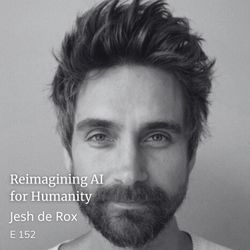
152. Reimagining AI for Human Growth
59:45||Season 2, Ep. 152In this episode of Corporate Unplugged, Vesna explores new worlds with Jesh de Rox, cultural anthropologist and founder of hOURS. They explore the transformative potential of AI in enhancing human connection and creativity. Jesh shares his journey from being a renowned photographer to a visionary leader in social technology, emphasizing the importance of nurturing environments that foster human growth.Jesh discusses his shift from seeing himself as a healer to a gardener, focusing on creating conditions for people to thrive. This metaphor underpins his work at hOURS, where he aims to build scalable systems that promote epiphanies and personal development. He envisions a future where technology supports collective intelligence, drawing from the deep well of human creativity and emotion.The conversation also touches on the limitations of current AI systems, which often lack depth and fail to capture the richness of human experience. Jesh advocates for a new approach that respects individual data ownership and incentivizes genuine contributions to a collective intelligence network.This episode reflects on the role of trust and purpose in this journey, highlighting the urgent need for businesses to align with human-centric values. It is a call for leaders to embrace boldness and authenticity in shaping a future that prioritizes growth and connection over profit and exploitation.In this episode:Transitioning from healing wounds to cultivating growth.AI that can enhance human creativity and connection.Personal data ownership – crucial for ethical AI development.Trust and purpose – essential components of systems aligned with human values.A call for leaders to prioritize meaningful contributions over profit.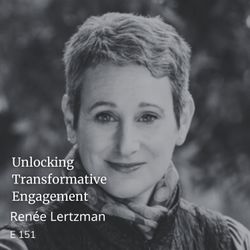
151. Unlocking Transformative Engagement
41:03||Season 2, Ep. 151In this episode Vesna sits down with Dr. Renée Lertzman, a renowned psychologist and strategist, to explore the intricacies of creating genuine engagement within organizations. Renée shares her insights on leveraging psychology to drive transformative change and how leaders can foster resilience in the face of volatility.She emphasizes the importance of intrinsic motivation, highlighting key drivers like mastery, purpose, autonomy, connection, and belonging. This challenges traditional approaches to change management, advocating for a shift from pushing and persuading to guiding and partnering with teams.The conversation delves into the psychological aspects of courage and how organizations can create environments that enable individuals to access their inner strength. Dr. Lertzman also discusses the significance of integrating experiences into daily practice, ensuring that transformative moments lead to sustainable change.Join us as we uncover strategies for unlocking potential and driving meaningful change in today's complex world.On today’s podcast :Intrinsic Motivation: Mastery, purpose, autonomy, connection, and belonging.Guiding Over Pushing: Shift from traditional methods to a partnership approach in leadership.Courage and Resilience: Creating conditions that enable individuals to access their courage.Integration of Experiences: Ensuring transformative experiences are integrated into everyday practice.Psychological Approach: Using psychology to foster engagement and manage change effectively.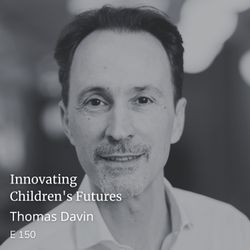
150. Innovating Children's Futures
32:41||Season 2, Ep. 150Thomas Davin is the Global Innovation Director at UNICEF. With over two decades of experience in international development and humanitarian work, in this episode of Corporate Unplugged Thomas shares his insights on leveraging innovation to address global challenges affecting children.He emphasizes the critical role of young people as active contributors to climate innovation and highlights UNICEF's efforts to empower youth through initiatives like climate accelerators, which support young innovators in developing impactful solutions. UNICEF's strategic approach to identifying and scaling innovative solutions has stretched to cover 160 countries. Thomas explains how his team identifies key problems affecting children, such as the learning crisis where a significant percentage of children cannot comprehend texts they read. By vetting and adopting successful solutions from various regions, UNICEF aims to address these challenges effectively.Thomas discusses the importance of building future leaders through programs like Upshift, which equips young people with skills in critical thinking and problem-solving. This initiative has reached over 1.5 million adolescents globally, fostering a generation of adaptable and innovative thinkers poised to shape the future.Throughout the episode, Thomas reflects on the power of collaboration and co-creation in solving complex global problems. He underscores the need for bold thinking and unlearning conventional approaches to drive meaningful change.Thomas powerfully expresses his passion for social justice and his vision for a future where every child has equal opportunities for quality education and health. He advocates for hope and empathy as essential elements in addressing global challenges and building a more equitable world.In this episode: UNICEF's focus on accelerating impact for children globally through innovative solutions.Identifying key problems, vetting solutions, and facilitating adoption and scaling of effective interventions.Importance of storytelling and highlighting successful local examples to inspire replication.UNICEF's "Upshifts" curriculum empowering young entrepreneurs and changemakers.Co-creation and "unlearning" as powerful tools to unlock new perspectives.Thomas's personal commitment to social justice and equal opportunities for all children.Advice to leaders on being bold, daring, and continuously challenging themselves and their teams.